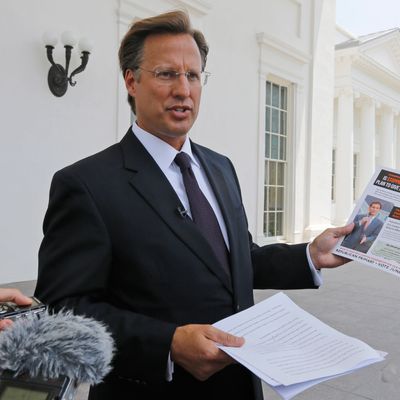
Lots of people are excited by Randolph-Macon College professor Dave Brat’s stunning defeat of House Majority Leader Eric Cantor in Virginia’s seventh district last night, mostly because Cantor was one of the most-loathed conservative figures in the country, and because genuine political upsets are rare these days.
But one subset of Republican voters — namely, evangelical Christians with an interest in economics — should be more excited than most. Because, in addition to getting a tea-party conservative on the ballot, they just got a new poster boy for their cause.
Like much about Brat, his religious beliefs aren’t well known. (Although he did credit his upset to “a miracle from God,” so it’s safe to assume he spends at least some time in church.) But in his writings, Brat seems eager to fuse Christianity and the generally secular field of academic economics. A review of several of Brat’s academic papers reveals that he sees free-market economics as being intricately linked to ethics and faith. He’s not just a professor who happens to believe in God; he wants to put God at the center of his work.
In one unpublished paper from 2005, “Adam Smith’s God: The End of Economics,” (Word doc here), which I accessed through a Google Scholar search, Brat makes the case that even though Adam Smith (the father of modern economics and author of The Wealth of Nations) is thought of as one of the great figures of the Enlightenment, his “invisible hand” theory should properly be seen in the context of Christian moral philosophy.
“In fact, [Smith’s] system really retains most of the fundamental features of the Judeo-Christian system,” Brat writes. “On paper he places Stoic reason above Christian revelation. But on the other hand, he chooses the Christian God over the Stoic God. And in the end, his choice of virtues and ends take a decidedly Christian turn.”
Brat also claims that, although Smith never invoked God in his economic writing, he was influenced by the Protestant culture he grew up in:
Smith was from a Red state. This means that the culture and context which produced Smith was overwhelmingly Protestant. This context clearly shaped the education and thought of Smith. The elites of his day and the institutions of his day were predominantly Protestant. Smith worked within these institutions.
This is, of course, a radical rereading of Smith’s work (and, if you ask me, an incorrect one). But Brat doesn’t seem to care much for mainstream economic dogma. Elsewhere, he makes a subtle dig at secular academics, whom he claims are unaware of their ideological biases when conducting supposedly objective research:
In our economics textbooks, we act “as if” we are doing positive economic science on the one hand and we leave normative analysis for others with modern expertise. In fact, we are not doing positive science and no one really comes around to clean up the normative mess we leave behind. To get it right, we must go back to the father of economics, Adam Smith, the author who unifies our moral and economic universe.
Brat’s views are extremely unorthodox in his field — he’s essentially claiming that modern economics is ideologically corrupt. As Vox’s Zack Beauchamp puts it, Brat believes that “most economists are motivated by philosophy rather than science: they’re secretly utilitarians who believe that the goal of public policy is to produce the greatest good for the greatest number.”
But Brat goes further than simply questioning economic dogma and trying to reclaim Adam Smith for the Christian intellectual tradition. In a 2004 paper, “Economic Growth and Institutions: The Rise and Fall of the Protestant Ethic?” (PDF here), Brat again returns to the link between historical Christianity and modern economic theory, claiming that countries with Protestant pasts have inherent economic advantages over countries without them.
“Give me a country in 1600 that had a Protestant led contest for religious and political power and I will show you a country that is rich today,” Brat wrote, while claiming that Protestantism “provides an efficient set of property rights and encourages a modern set of economic incentives” that often lead to “positive economic performance.”
The Christian right can be a lonely place for serious academics. Especially in the hard and social sciences — where naturalistic world views are standard among those taken seriously — it’s difficult to be both a public, strident evangelical Christian and a mainstream, successful member of the academy. It’s why, typically, professors at top-tier colleges tend to keep their personal religious views close to the vest. And it’s why academics like Gary North and Robert P. George become famous in Christian circles — when a professor comes along who has both impressive secular credentials and a strident religious worldview, they’re immediately moved to the front lines of the culture war.
Not all of Brat’s economic work is religious — he’s written papers on secular topics like “The Mortgage Crisis and Credit Crunch: From Housing Losses to Balance Sheets to a Decrease in Economic Growth” — but it’s clearly his passion. If he wants to, he could easily be the next big rock-star Christian academic. He has the résumé of a serious scholar — American University Ph.D., Princeton Theological Seminary M.Div. — and he hasn’t shied away from discussing the religious context for his work. When he ends up in Congress, he’ll have one of the biggest platforms of any Christian academic in America, if he chooses to use it. The tea party got a new representative yesterday, but the evangelical academy may have gotten a miracle.





























